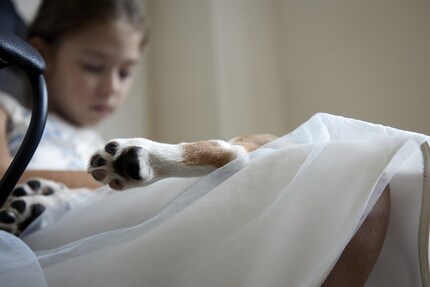
Guide
Paw + Order: feeling sorry for stray animals when you’re on holiday? This is what you can do
by Darina Schweizer

It hurts to let a pet go, and if it’s not your own you often feel guilty. What do I do if a pet dies when I’m looking after it?
That was scary! When I was in primary school, I once looked after two of my neighbour’s budgies during the holidays. After I had let them fly around my nursery, I lured the colourful birds back into their cage. That’s where it happened. The green parakeet suddenly toppled off the stalk. I tried everything to resuscitate him.
I still have a guilty conscience to this day. Although my neighbour accepted the loss with astonishing composure, I had the feeling that I’d neglected my responsibility. Should I have bought her a new bird? What rights and obligations do pet sitters and pet owners have? I asked Michelle Richner, legal researcher at TIR «Foundation for Animals in Law» a few questions.
So, Michelle Richner, what do I do if a pet dies?
The death of a pet is, of course, very sad for everyone involved. Even if it’s hard to talk about, it’s advisable that the caregiver and owner discuss the worst-case scenario in advance.
What needs to be discussed?
For example, in the event of death, whether the animal should be kept or taken directly to the animal body collection point or a pet crematorium. It’s also possible to hand over the deceased animal to a vet for safekeeping.
Does it matter if it’s my fault?
Yes, this definitely plays a role, especially if an animal is being looked after by a professional pet sitter. In this case, a duty of care is owed due to the underlying contractual relationship. If this is violated, the owner is entitled to compensation.
What exactly does this include?
For example, the purchase price of the animal or the costs of cremation. Plus, they may be entitled to compensation and so-called affection value compensation. This refers to the value that owners or their relatives place on an animal for purely emotional reasons. This can considerably exceed the material value of the animal.
And what if it’s not a professional pet sitter, but a neighbour or friend?
The standard of due diligence is set lower here. Particularly if the care is provided free of charge, there must be serious fault in order to be able to effectively claim compensation.
What would be an example of serious culpability?
This would be the case if you simply forget to feed the animals or fail to realise that an animal’s sick because it’s not eating or drinking and is not receiving veterinary care. It’s also serious if, for example, you let pet cats or pet birds escape because you forget to close the balcony door or aviary.

Is it worthwhile for both professional and non-professional sitters to record certain things in writing?
Yes, definitely. It’s advisable to specify the remuneration, number, time and duration of the assignments. If the animal requires medication, the dosage must be agreed. The sitter should also be informed who the animal’s vet is and whether there’s an emergency contact. It’s also helpful to know whether an animal may be anaesthetised and what to do in the event of death.
What should you look for in a pet sitter?
At best, a professional pet sitter will have animal care training or at least a specialist non-vocational training in animal care. In Switzerland, a permit from the cantonal veterinary office is also required to care for five or more animals. You’re allowed to ask if the sitter’s had the appropriate training or a certificate to prove their skills.
Does it make sense to get to know each other beforehand?
Yes. It’s a good idea for dog sitters if the person comes over for a dog walk together, for example. This also gives the pet owner the opportunity to ask the sitter questions. In addition, the sitter might already have some references that you can check. I wouldn’t advise booking directly via the internet without first getting to know each other.
What’s the maximum time a pet should be left in someone else’s care?
That really depends on the species. Small animals such as guinea pigs or rabbits, but also chickens or goats, can be looked after for up to two months. We recommend a maximum of two weeks for cats, whereby more care time must certainly be taken into account for indoor cats than for outdoor cats. With dogs which are extremely people-oriented, it very much depends on the individual character.
What experience have you had with pet sitters? Let me know in the comments!
I like anything that has four legs or roots. The books I enjoy let me peer into the abyss of the human psyche. Unlike those wretched mountains that are forever blocking the view – especially of the sea. Lighthouses are a great place for getting some fresh air too, you know?